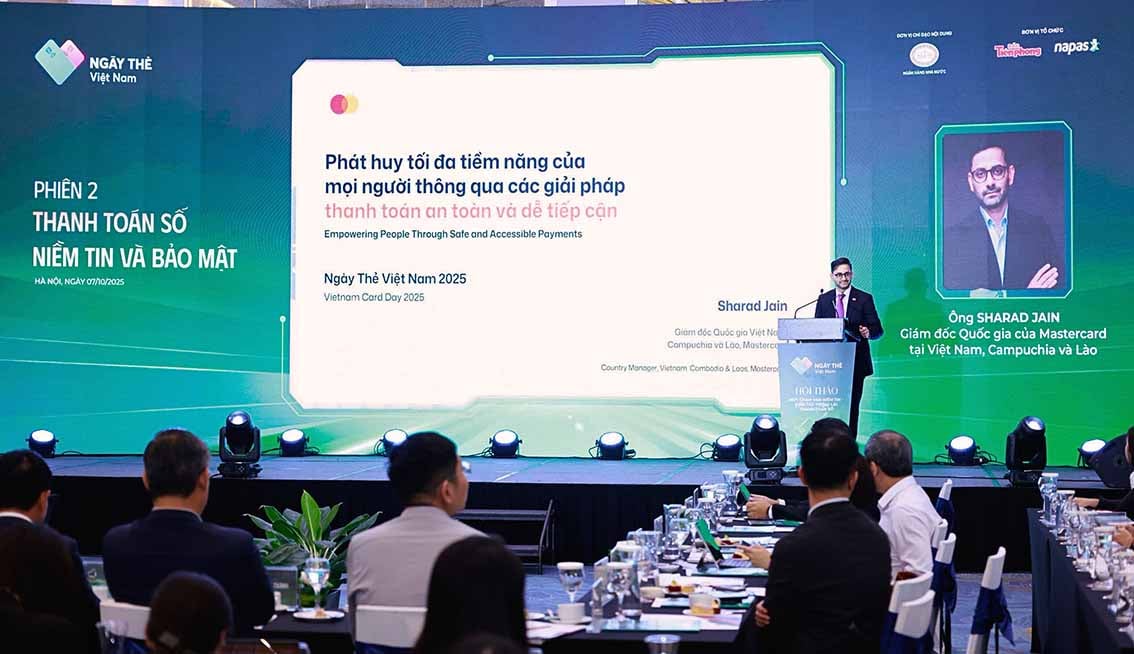Amidst Vietnam's accelerating digital economy , cashless payments are increasingly asserting their central role in financial and economic life. Alongside opportunities, challenges regarding security, trust, and accessibility remain. This was also the topic discussed at the Vietnam Card Day 2025 conference, held on October 7th in Hanoi, with the theme "One Touch - A Thousand Trusts: Shaping the Future of Digital Payments".
The event was organized by Tien Phong newspaper and the Vietnam National Payment Corporation (NAPAS), in collaboration with relevant units. During the security discussion session, Mr. Sharad Jain, Country Director of Mastercard in Vietnam, Laos, and Cambodia, presented a paper titled "Unleashing Human Potential Through Secure and Accessible Payments."

According to the State Bank of Vietnam , by the end of 2024, the country will have over 204.5 million individual payment accounts and more than 154.1 million active cards. Nearly 87% of people over 15 years old will have bank accounts. In 2024, the total value of cashless payments will reach VND 295.3 trillion – 26 times Vietnam's GDP. Notably, the number of transactions via QR code in the first quarter of 2025 is expected to increase by more than 81% compared to the same period last year, becoming the fastest-growing and most widely adopted cashless payment method.
Mr. Sharad Jain believes these figures demonstrate Vietnam's impressive transformation in the digitalization of payments. Digital payments not only simplify daily transactions but also open up opportunities for people to access transparent and secure finance, while supporting businesses in integrating more deeply into the digital economy.
However, along with that boom come three major challenges that the entire industry needs to address: accessibility, security, and customer experience.
Regarding accessibility, despite the rapid development of digital payment infrastructure, 62% of Vietnam's population still lives in rural areas – where many vulnerable groups do not have full access to services. To address this issue, according to Mr. Sharad, Vietnam already has a good foundation with eKYC, QR code networks, and biometrics. In the next phase, it is crucial to simplify access to digital solutions and foster close collaboration between the government , banks, fintech companies, and technology firms.
Regarding security, he stated that despite technological advancements, concerns about safety remain the primary reason many people are hesitant about digital payments. Vietnam has recorded tens of thousands of online scams, card fraud, and cyberattacks in recent years, causing significant losses and eroding user trust. Mastercard currently prioritizes security and trust: in 2024, its network processed over 159 billion global transactions, and it has invested $10.6 billion in cybersecurity innovation since 2019. AI and machine learning solutions help detect fraud in real time, mitigating risks for consumers and financial institutions.
Several technological solutions, such as Consumer Fraud Risk and Mastercard Identity Solutions, are being implemented to protect "underground" transactions, ensuring security without disrupting the user experience. Thanks to these technologies, Mastercard has prevented $47.9 billion in fraud losses over the past three years.
In terms of user experience, this is key to the sustainable development of digital payments. For consumers, digital payments offer convenience, speed, and transparency; while for businesses, especially small and medium-sized enterprises, it's an opportunity to expand their customer base, increase operational efficiency, and connect with the e-commerce ecosystem.
Mr. Sharad Jain emphasized that technology is only truly meaningful when it is simplified and easy to use, helping people form daily payment habits. To achieve this, close cooperation between the government, banks, and technology companies is needed to expand payment infrastructure and conveniences.
Recognizing Vietnam as one of its key markets, Mastercard aims for 100% of card transactions in Vietnam to be tokenized and securely authenticated by 2030. Mastercard has partnered with Vietnam for over 15 years in its journey towards digital payments and is committed to further enhancing real-time payment efficiency through fraud prevention, ensuring secure cross-border data flows, and promoting technological innovation according to global standards.
Source: https://doanhnghiepvn.vn/kinh-te/ba-thach-thuc-lon-cua-thanh-toan-so/20251008070315941















































































































Comment (0)